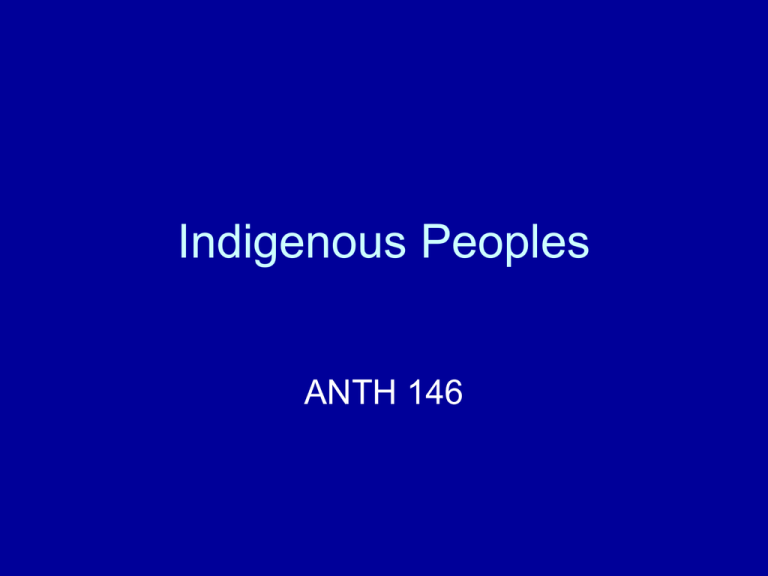Indigenous Peoples ANTH 146
advertisement

Indigenous Peoples ANTH 146 Terms • • • • Indigenous peoples• Tribal / Tribal people Genocide • Ethnocide Terra Nullius • Social Darwinism Imperialism • Economies and • Exchange • Colonialism Indigenous People • claim their lands because they were the 1st or have occupied them since time immemorial • are groups that have been conquered by peoples racially, ethnically, or culturally different from themselves (Colonization, Westernization, Urbanization and the role of Nation State) • Native peoples of the Americas share many parallels with indigenous peoples today • Indigenous peoples had no place in the making of the Nation-state. Social Darwinism • Theory of social evolution • Based on Darwin’s theory of evolution • Scientific support for imperialism – Proved Western superiority – Justified imperialism in the name of progress. Social Darwinism • Placed societies on an evolutionary framework • Hierarchy with indigenous and tribal peoples at the bottom and Western societies at the top • Natural order of things was for stronger, more advanced people to conquer and rule over weaker, more backward ones • To overcome “backwardness” and indigenous society was urged to: • • • • Abandon its traditional way of life Abandon its language Cease to exist as a separate society Assimilate with the population Ethnocide • Conquest of the indigenous peoples was justified – They were not fully human (no rights) – Need to civilize them – Development • Indigenous peoples stand in the way of development • If indigenous peoples unwilling to assimilate • They undermine the State • Impede modernization Economies • Definition: Making or getting a living • Production, Distribution, Consumption • Economic types: – Foraging, food-collecting reciprocal exchange, mobile bands, consumption for survival • Horticulture, garden cultivation redistribution by chiefs for prestige • Pastoralism redistribution Agriculture market exchange, private land ownership Industrialization – of goods and food Exchange • Exchange (distribution of goods) promotes social cohesion • Major types of exchange: – Reciprocity – Redistribution – Market Reciprocity • • • • • Food collecting, small-scale societies Egalitarian Fosters long-term relations Everyone taken care of moral economy Redistribution • Centralized collection of surplus (food, goods, etc.) by chief • Redistribution through feasting – provides for all • Often competitive -- gain in status, prestige Market Exchange • Buying/selling of commodities (even food) • Direct exchange of goods (barter) • Exchange through money Nomads: Foragers/Pastoralists • • • • Highly mobile Inconvenient to nation-states Straddle national boundaries Disrupt the imaginary map of homogenous development • Hunter and Gatherer • Pastoralists – Animal husbandry • Horticulturalists – Swidden agriculture / slash and burn Indigenous cultures are not extinguished by natural laws but by political processes that are susceptible to human controls.

